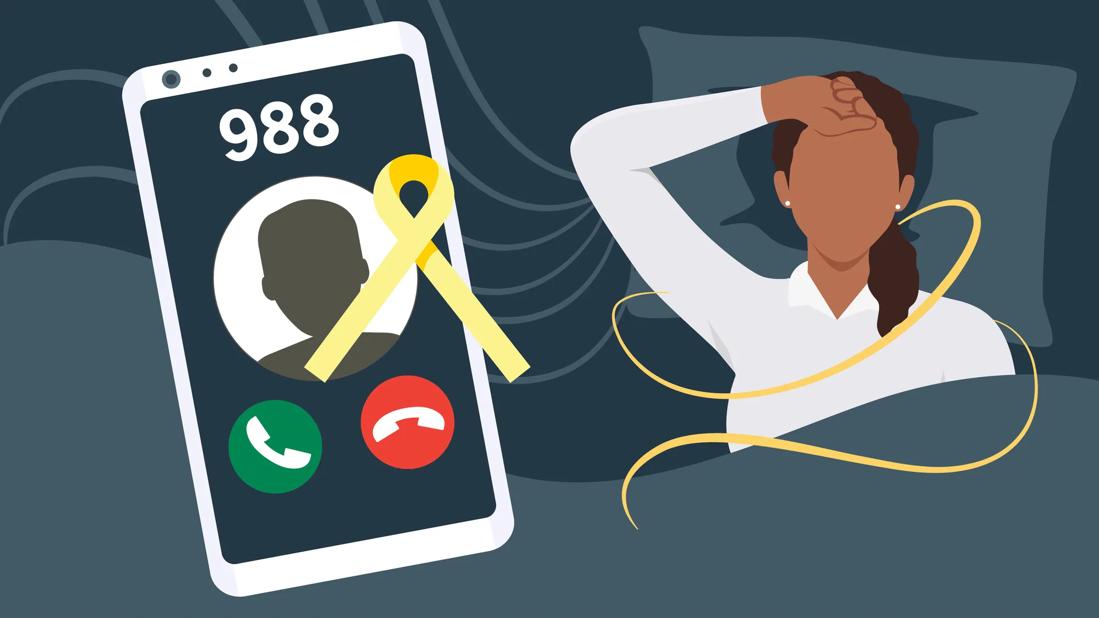Dialing 988 connects you to a network of counselors who can offer support you need

Image content: This image is available to view online.
View image online (https://assets.clevelandclinic.org/transform/351c85c9-8380-4846-a818-f15620cc6459/suicide-hotline-2014633179)
Person in bed with an illustration of a large phone next to them displaying the numbers 988
No matter how bad things may seem at a given moment, suicide is never the answer to your problems. There is always hope — and if you can’t see that, there are people available right now to help you find it.
Advertisement
Cleveland Clinic is a non-profit academic medical center. Advertising on our site helps support our mission. We do not endorse non-Cleveland Clinic products or services. Policy
The 988 Suicide & Crisis Lifeline offers support to anyone in a moment of personal crisis. Don’t hesitate to call if that’s you, says psychiatrist Tatiana Falcone, MD. Just pick up your phone and dial 988.
Here’s what you can expect if you reach out.
The 988 Lifeline offers free and confidential emotional support to people in a suicidal crisis or emotional distress. It is available 24 hours a day, seven days a week, across the United States and its territories.
The three-digit number functions like another well-known emergency line (911) to deliver instant assistance to people in a time of great need. (Assistance is also available if you’re concerned about a loved one and want advice.)
The suicide and crisis hotline offers callers support in English and Spanish and uses translation services for more than 240 additional languages. It also provides teletypewriter (TTY) services for those with hearing impairments.
Aside from calling, you can text 988 to get connected to support. You can also chat with counselors online at 988lifeline.org.
988 debuted in 2022 as a transition from the 10-digit National Suicide Prevention Line. The original suicide hotline number remains active and will reroute callers to the existing 988 network.
Advertisement
A five-step process begins after you dial 988. Let’s go through it.
If needed, a counselor may be able to activate a mobile mental health crisis team to your location. “Mobile crisis response teams aren’t available in all places, but when it’s available, it’s a great resource because it can help you manage your crisis in the moment,” says Dr. Falcone.
Your counselor may ask about scheduling a follow-up call to check in and see how you’re doing or if you need any additional support.
“Having a three-digit number that connects you to a specialized counselor who can help manage your symptoms before you have a suicide crisis is very important because they can tailor their help to your needs,” explains Dr. Falcone. “Interventions like this are lifesaving.”
988 is for anyone who wants someone to talk to in a moment of need. Call 988 if you are thinking of self-harm, suicide or death or dealing with any personal crisis that feels overwhelming.
Reasons to call could include:
Don’t wait until you’re at your lowest point to call the suicide hotline or ask others for help, urges Dr. Falcone. It’s OK to reach out if you’re feeling a little blue and just need to talk to someone to get through it.
“When you’re having a bad day or negative thoughts, it can be hard to see all of the choices you can make,” says Dr. Falcone. “Lifeline counselors can walk you through different tools you can use to cope in the moment and help you see the big picture from another perspective.”
Open up and be honest. The more information a counselor has, the more they can do for you. Dr. Falcone suggests:
Advertisement
“Think of it like any other consultation,” says Dr. Falcone. “If you go to the emergency room because you have pneumonia but don’t tell them you’re coughing or have a fever, it’s very hard for them to provide the special care you need to feel better.”
Your conversation with the counselor is confidential and doesn’t go into your medical record.
If you’re in the midst of a mental health crisis and thinking of suicide, connect with someone to talk. 988 is ALWAYS available as an option. It’s a safe outlet where you can share your feelings without judgment.
Again, think of your situation as a medical condition that needs immediate attention. “If you’re having a heart attack, you want help right now because it’s a crisis,” says Dr. Falcone. “If you’re having suicidal thoughts, you need help right now, too.”
Know that you’re not alone in dealing with these feelings, too. National surveys show that:
“Unfortunately, most people aren’t seen until after they’ve already attempted suicide,” says Dr. Falcone. “But suicide is a preventable cause of death if you’re able to ask for help during your moments of crisis.”
Advertisement
And know that help is available at the suicide and crisis hotline by dialing 988.
Advertisement

Sign up for our Health Essentials emails for expert guidance on nutrition, fitness, sleep, skin care and more.
Learn more about our editorial process.
Advertisement
Let kids know it’s OK to get help for mental health
OTC meds, rest, fluids and an anti-inflammatory diet can help you get through big and small weather changes
Communicating clear limits helps protect your time, energy and emotional well-being
Being hooked on love can cause unhealthy relationship patterns and obsessive thoughts
Even small moments of time outdoors can help reduce stress, boost mood and restore a sense of calm
Exploring your hidden side can lead to better understanding of what makes you tick
Burnout is often driven by long periods of stress without time to recover — but practicing self-care and creating work/life boundaries can help
When someone guilt trips you, they’re using emotionally manipulative behavior to try to get you to act a certain way
Although it could be used as a moisturizer, this new trend is not recommended
Communicating clear limits helps protect your time, energy and emotional well-being
High cholesterol can be genetic, but testing and treatment can lower your heart disease risk